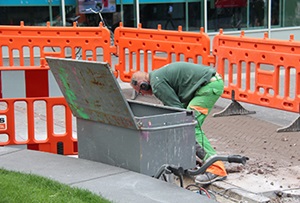
25 jul Clearer requirements for posted third-country nationals
The Dutch government is introducing clearer rules for so-called third-country nationals. The aim is to put an end to loopholes involving posted third-country nationals.

Practical information Work and residence permits
Third-country nationals are workers from outside the EU who come to work in the Netherlands via a work and residence permit from another European country. They are only allowed to work in the EU if they have a work and residence permit. Unlike other countries, the Netherlands is very reluctant to issue these permits. Some people still manage to find work in the Netherlands via a loophole.
An example
Recently, the Dutch Labor Inspectorate (NLA) fined a Polish entrepreneur and three flower bulb and vegetable growers in North Holland nearly € 175,000. These fines were for, among other things, the illegal employment of at least 26 migrant workers from outside Europe.
The Polish entrepreneur recruited Belarusians via a PO box company in Poland and gave them a so-called ‘declaration for entrusting work to a foreigner’. This enabled these so-called third-country nationals to obtain a Polish D visa, which, in combination with the declaration, allows them to work and live in Poland. This visa (residence permit) is intended for persons who wish to stay in the Netherlands for more than 90 days. After spending a few days in Poland (without working there), the Belarusians were brought to the Netherlands, where they were provided with accommodation and work.
According to the NLA, this was a form of illegal secondment because there was a letterbox company in Poland where no ‘substantial activities’ were carried out. The migrant workers started working for Dutch horticulturalists immediately, without first having worked in Poland.
Loophole
If an employer allows third-country nationals to work through a letterbox company, this constitutes a loophole involving illegal posting. As a result, both the Polish entrepreneur and the Dutch horticulturalists were fined for illegally employing migrant workers.
Clearer rules on how long
European regulations do not clearly state how long someone must work in one country before they can start working in another European country. Research has shown that Dutch legislation and regulations offer some scope for clearer rules. Further details will be worked out on how long someone must work in another country before they can start working in the Netherlands.
Third-country nationals must in future have a work and residence permit in the sending Member State for the type of work they will be doing in the Netherlands. It is unacceptable for a Spanish work permit for the care sector to be used by a company from Cyprus to employ workers in a Dutch slaughterhouse.
Employee protection
Third-country nationals are relatively often victims of abuses such as underpayment, poor working conditions and, in the most serious cases, even labor exploitation.
The aim is therefore to protect these workers better by providing them with better information and support in seeking and finding legal assistance. Clearer regulations will give the Dutch Labor Inspectorate better tools to enforce the rules in the event of violations.
